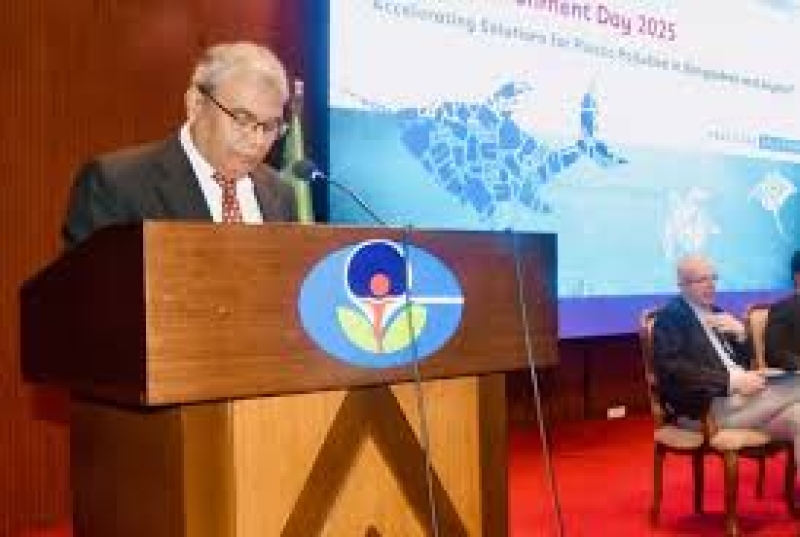- India Sees 9% Drop in Foreign Tourists as Bangladesh Visits Plunge |
- Dhaka Urges Restraint in Pakistan-Afghan War |
- Guterres Urges Action on Safe Migration Pact |
- OpenAI Raises $110B in Amazon-Led Funding |
- Puppet show enchants Children as Boi Mela comes alive on day 2 |
BIMSTEC Chief Urges Regional Unity on Plastic Pollution

Secretary General of the BIMSTEC Indra Mani Pandey has underscored the urgency of addressing plastic pollution as a shared global and regional threat, urging collective solutions.
“BIMSTEC stands ready to deepen regional cooperation to achieve a plastic-smart Bay of Bengal region,” he said while speaking at a high-level dialogue here today.
Department of Environment (DoE) of Bangladesh, in collaboration with the United Nations Office for Project Services (UNOPS) and BIMSTEC organized the seminar titled “Accelerating Solutions for Plastic Pollution in Bangladesh” to accelerate sustainable plastic management solutions.
The event brought together government leaders, private sector representatives, youth activists, innovators, and international stakeholders.
Country Manager of UNOPS for Bangladesh and Bhutan Sudhir Muralidharan inaugurated the seminar held at DoE’s conference room. Secretary of the Ministry of Industries Obaidur Rahman addressed the seminar while Director General of the Department of Environment Dr Md Kamruzzaman was in the chair.
“Plastic pollution is not just an environmental issue, it is an infrastructure and behavioral challenge that demands bold, collective action,” Muralidharan said.
UNOPS is committed to supporting Bangladesh through scalable solutions and regional partnership to turn ambitious targets into measurable impact, he said.
According to UNOPS, more than 87,000 tons of plastic wastes enter Bangladesh’s marine ecosystems each year, posing a severe threat to ecosystems, public health, and the economy.
This alarming situation necessitates an urgent shift in the country’s waste management strategies, speakers said.
Participants discussed innovative financing models and behavioral change strategies. The forum also highlighted national policy implementation, innovation in the petrochemical sector, and the role of media in driving public awareness on plastic pollution.
The dialogue reaffirmed Bangladesh’s dedication to its National Action Plan for Sustainable Plastic Management (2020–2030), which targets a 30% reduction in plastic waste, 50% recycling, and elimination of 90% of identified single-use plastics by 2026.
Among the key expected outcomes of the seminar are a Joint Communiqué and the identification of pilot initiatives to promote cross-border cooperation in addressing marine plastic pollution.
The event also seeks to foster public-private partnerships, green financing, and technological innovations to support a circular economy.
“We must embed sustainability into every level of industrial development. This seminar is an important step toward aligning environmental responsibility with industrial transformation,” said Obaidur Rahman.
Director General Dr Md Kamruzzaman said the Department of Environment remains committed to implementing the national plastic action plan through innovation, accountability, and inclusive cross-sector and cross-border collaboration, reports BSS.

